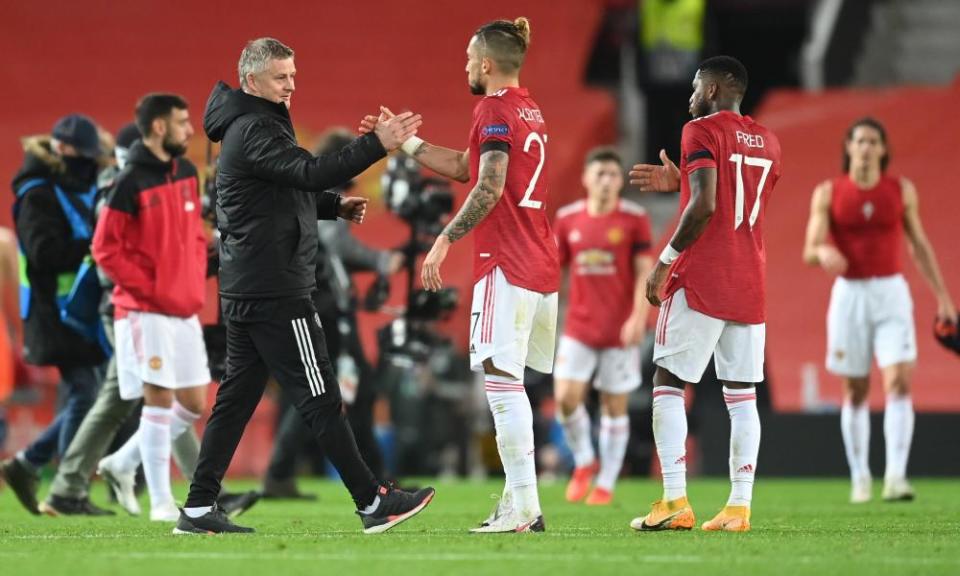Solskjær takes the handbrake off but can he do it when it really matters?

Up in the Old Trafford stands sat Sir Alex Ferguson: quiet and discreet, 80 next year, watching the game in a suit and tie and a club-branded mask. There was no furious chewing of gum, no swearing at the fourth official. And in a way, to glimpse the present-day Sir Alex through a shaky television long lens is to be reminded of the extent to which his genius was grounded in performance. For Ferguson, management was theatre: the taps on the watch, the press conference mind games, the affected fits of anger. Ferguson understood, as did so many of the game’s great coaches, that the bigger you made yourself, the bigger the shadow you cast.
In a way, this was the best way of understanding United’s triumph here: a 4-1 victory over Istanbul Basaksehir that was effectively sealed in the first 20 minutes, and less effectively protected in the last 20. The underlying numbers will tell you just how threatening Istanbul were at times: taking 13 shots to United’s 14, enjoying long spells of possession, moving the ball smartly up the flanks. But to a large degree, this was not a game about underlying numbers.
Related: Bruno Fernandes leads Manchester United to Istanbul Basaksehir win
Instead, this was a game about aspiration: about the sort of football United can produce with the handbrake off. Indeed, Ole Gunnar Solskjær’s starting lineup barely acknowledged the existence of a handbrake at all: Donny van de Beek in a midfield two, all four of United’s first-choice attackers selected at once. Only in the second half, as United’s attacking supremacy collided with cold, boring reality, did they adopt a more circumspect approach.
And yet the startling sparkle and thrilling abandon of those opening moments remain the most powerful motif from this game. Within two minutes, Marcus Rashford had come close to scoring the goal of the year, carving a swathe through the heart of the Istanbul defence with a run of Hollywood daring and Hollywood implausibility. Within seven, Bruno Fernandes had smashed United into the lead from 25 yards, a brilliantly instinctive half-volleyed finish that an analyst would probably have discouraged on the basis of its low xG.
This was often how Ferguson’s United would start against smaller teams in Europe: the lightning start, the pure expression, the teamsheet itself dripping with disdain and condescension. There you are. That’s what we think of you. Lads, it’s Istanbul Basaksehir. Perhaps it wasn’t always like this, and perhaps it didn’t always work. But at this distance it barely matters: what matters is what we remember, the blur of colour and movement and noise, the restless urgency of a team who had no time for anything as prosaic as thinking.
The point is that a lot of the time, how you project yourself matters. By the time Fernandes had burgled his second goal on 20 minutes, Istanbul were well and truly spooked: gaunt and wooden, with the bilious foreboding of a team who had eaten too much cake. Perhaps they had expected the United of the reverse fixture in Turkey, a team of furrowed brows and buried angst, overthinking itself to the point of nonsense. Either way, by the time they finally appeared, they had already been dispatched.
In a way, this is why we can’t read too much into this game. Not all of United’s opponents will be carved open by a simple long ball from the edge of the penalty area, as Victor Lindelöf ensured the Turkish side were on 35 minutes, setting Rashford free to win the penalty that made it 3-0. Not all of United’s opponents will select their starting XI from an episode of 2013-14 Premier League Years: Nacer Chadli, Demba Ba, Martin Skrtel, Rafael.
But there was at least a template here, a gameplan that went beyond pure vibes. While Alex Telles advanced from left-back to allow Anthony Martial to play more centrally, Aaron Wan-Bissaka stayed back, Fernandes and Van de Beek often dropping in to support him.
Van de Beek had his best game in a United shirt: dynamic, creative, economical and yet effective. You wonder, on some level, where this leaves Paul Pogba: a master tailor in a world of sewing machines, a midfielder who prefers to pick teams apart rather than rip them open.
And even in victory there remain questions for United to answer. Edinson Cavani looks just a little too eager to contribute, positionally loose and heavy of touch. Daniel James still looks desperately short of confidence despite his late well-taken goal. And then you have the defence, which was tested a little more than Solskjær will have liked. “Wake up! Wake up!” David de Gea shouted as Edin Visca rattled the bar in the second half, briefly threatening to make it 3-2 and a tight finish.
Perhaps this is the next hurdle for United: to play with this sort of freedom, this sort of poise, in the periods that really matter. This was the thing about Ferguson teams: often they played on instinct, but when they needed to think or grind their way through, they could do that too. For Solskjær’s skittish and occasionally thrilling squad, this is the test that will define them.

 Yahoo Sports
Yahoo Sports 